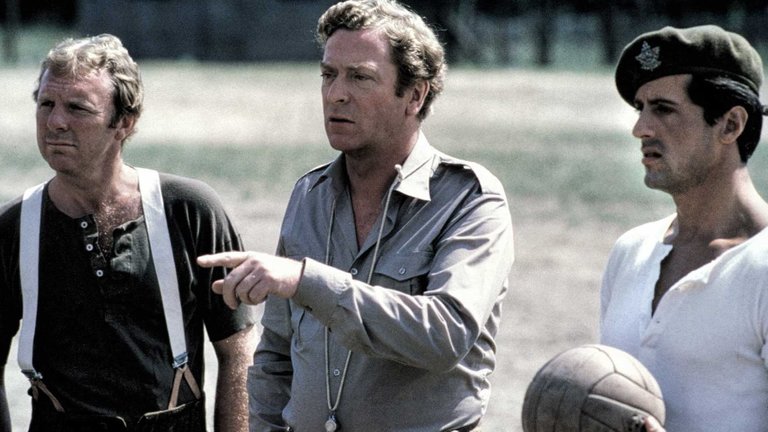Film Review: Escape to Victory (1981)

Football (or “soccer”, as it is known on the other side of Big Pond) is the most popular sport in the world, but you couldn’t tell it based on Hollywood films. Unfamiliarity of US audience with the sport is just a piece of explanation, especially in these days when Hollywood studios rely more on the global football-loving audiences. The more important reason is in the Beautiful Game itself. Football, with its rules and 22 men chasing a ball on a football pitch for 90 minutes, simply isn’t that filmable and makes it very difficult for anyone trying to bring its spectacle, excitement and drama on a big screen in credible way. Those difficulties might become quite apparent after watching Escape to Victory, 1981 film directed by John Huston, often regarded as the most spectacular, the most ambitious and arguably the best football film ever made.
Escape to Victory is not a pure sports film and, for the most part, works as WW2 prison drama instead. The plot is set in 1943 and begins in German camp for Allied prisoners. One of those is British Captain John Colby (played by Michael Caine), who is recognised by Major Karl von Steiner (played by Max von Sydow), one of German officer and former football player, as pre-war star of English team West Ham United. Steiner gets an idea of staging friendly match between Allied prisoners and German team. Colby and other Allied officers are at first against it, but later change their mind when it becomes apparent that the match would take place at Colombes stadium in occupied Paris, and that French Resistance has a plan to help Allied team members escape during half-time. Captain Robert Hatch (played by Sylvester Stallone), American serving in Canadian Army, has actually succeeded to escape, reach Paris and get in touch with Resistance, but now has to allow himself to be recaptured only to deliver critical message and Colby and join his team.
Script by Evan Jones and Yabo Yablonsky is inspired by the real event, so called “Death Match” that was played in Nazi-occupied Ukraine and in which players of Dynamo Kiev won against German team only to, according to Soviet official histories, be shot by SS afterwards. The main template for the plot is, however, the famous WW2 classic The Great Escape which featured legendary Steve McQueen in the role very much like the role Stallone plays in this film – the only American in the camp, hotheaded, insubordinate and wanting to get out of POW camp without much regard for the other prisoners. There is actually very little football in the film, and the iconic game is being played only at the last half hour or so.
John Huston, one of the most experienced Hollywood directors and with incredibly diverse filmography, did a very good job, even in difficult and demanding scenes that deal with the sport. In that he was helped by true experts – actual real-life football stars, including legendary and recently retired Pelé who plays Trinidadian soldier Luis Fernandez, and who actually designed some of the plays. He was aided by other football legends – English star Bobby Moore and Argentine star Osvaldo Ardiles who also appear as members of Colby’s team, while fans of 1970s and 1980s European football would probably notice many familiar faces. Huston also puts Hungarian locations to good use, with (now demolished) MTK Stadium in Budapest standing for Colombes.
Despite all the talents involved, Escape to Victory disappoints at the end. This is due to script not using its intriguing premise to the full potential. There are various ethical questions Colby and his men would have to solve – whether to participate what is clearly enemy’s propaganda stunt or not; whether to actually escape and risk reprisal against their comrades not given the opportunity and, finally, whether the actual escape is more important than symbolic and, in the grand scheme of things, meaningless victory on the pitch. Script doesn’t deal with issues because the film puts too much emphasis on Hatch’s character, who is not played that well by Stallone and who, despite being nominal hero, comes as arrogant, selfish and irresponsible and is hard for the audience to sympathise with. The script tries to solve this problem by pairing him with beautiful French widow (played by Carole Laure) whose personal loss reminds Hatch what is at stake and helps him see the error of his ways. But the most disappointing is the actual finale, in which Colby’s team decides to stay and win match, only to experience spectacular deus ex machina in form of French crowds invading the pitch and helping them escape in general mayhem. Script in that moment adopts Hollywood fantasy instead of WW2 realities, by refusing to allow German soldiers, brought with the explicit task of guarding the Allied prisoners, to even make few warning shots. Escape to Victory is a solid and mostly entertaining film, but those interested in seeing great football legends of the past would be better served by a documentary.
RATING: 6/10 (++)
Blog in Croatian https://draxblog.com
Blog in English https://draxreview.wordpress.com/
Leofinance blog https://leofinance.io/@drax.leo
Cent profile https://beta.cent.co/@drax
Minds profile https://www.minds.com/drax_rp_nc
Uptrennd profile https://www.uptrennd.com/user/MTYzNA
Hiveonboard: https://hiveonboard.com?ref=drax
Rising Star game: https://www.risingstargame.com?referrer=drax
1Inch: https://1inch.exchange/#/r/0x83823d8CCB74F828148258BB4457642124b1328e
BTC donations: 1EWxiMiP6iiG9rger3NuUSd6HByaxQWafG
ETH donations: 0xB305F144323b99e6f8b1d66f5D7DE78B498C32A7

Yay! 🤗
Your content has been boosted with Ecency Points, by @drax.
Use Ecency daily to boost your growth on platform!
Support Ecency
Vote for Proposal
Delegate HP and earn more